CHIC project: Breeding Chicory Roots for Health Products.
Don’t miss our new leaflet where we explain the main objective of CHIC project: To breed chicory roots to bring health products to the society!
Don’t miss our new leaflet where we explain the main objective of CHIC project: To breed chicory roots to bring health products to the society!
On Monday, 14th October 2019, the science programme FUTURIS, from the Euronews channel, made a documentary about the CHIC project.
They made several interviews to some of our partners and they also explained the benefits of implementing new plant breeding techniques, in chicory breeding, to convert it into a multipurpose crop and to obtain high value products for consumers’ health benefits.
On the other hand, our project coordinator, Dirk Bosch had a special interview in the Euronews Bonus Section. He provided detailed information about why we selected chicory as a promising and a strong crop to be converted into a multipurpose one.
The documentary has been translated into 12 languages and we want to thank the FUTURIS team for guiding us during the filming process and for bringing such a nice result.
Source:
https://www.euronews.com/2019/10/14/chicory-roots-will-boost-your-gut-health-say-scientists
https://www.euronews.com/2019/10/14/the-deep-rooted-truth-about-chicory-root
IBISS, partner in CHIC Project worked on organizing the presentation regarding the results of our CHIC Project, though team member Jovana Petrovic directly participated in this manifestation.
On September 27th 2019, Jovana Petrovic from University of Belgrade, Institute for Biological Research “Siniša Stanković“, National Institute of Republic of Serbia presented knowledge gained so far on health-beneficial effects of Cichorium intybus and its possibilities to be used on every day basis.
People seemed very keen to get to know with facts how this plant that grows on meadows nearby, could exert useful effects as a tonic, coffee substitute and prebiotic.
Since this manifestation is dedicated to popularization of science making it interesting to children of school age, retired people and overall families with children, this Researchers’ Night was a unique opportunity for people to get familiar with new breakthroughs in research that they could directly benefit on.
The presentation of the Project took place at Indjija, the intersection city between Belgrade and Novi Sad.
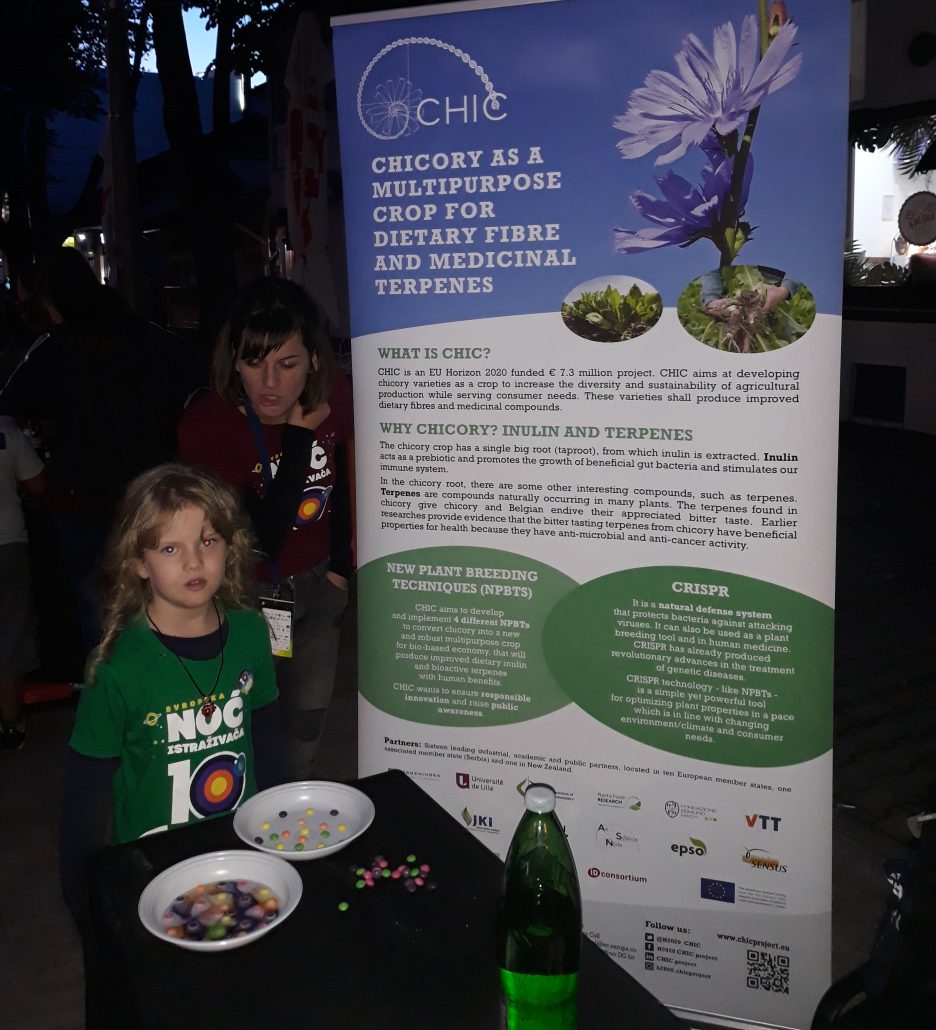
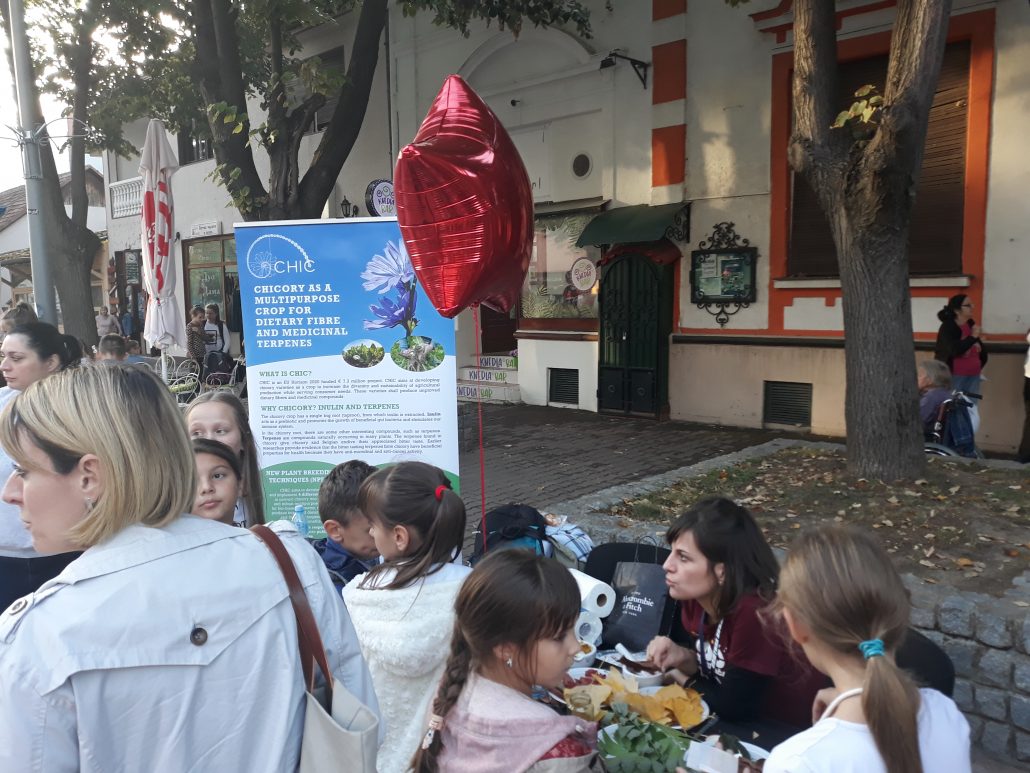
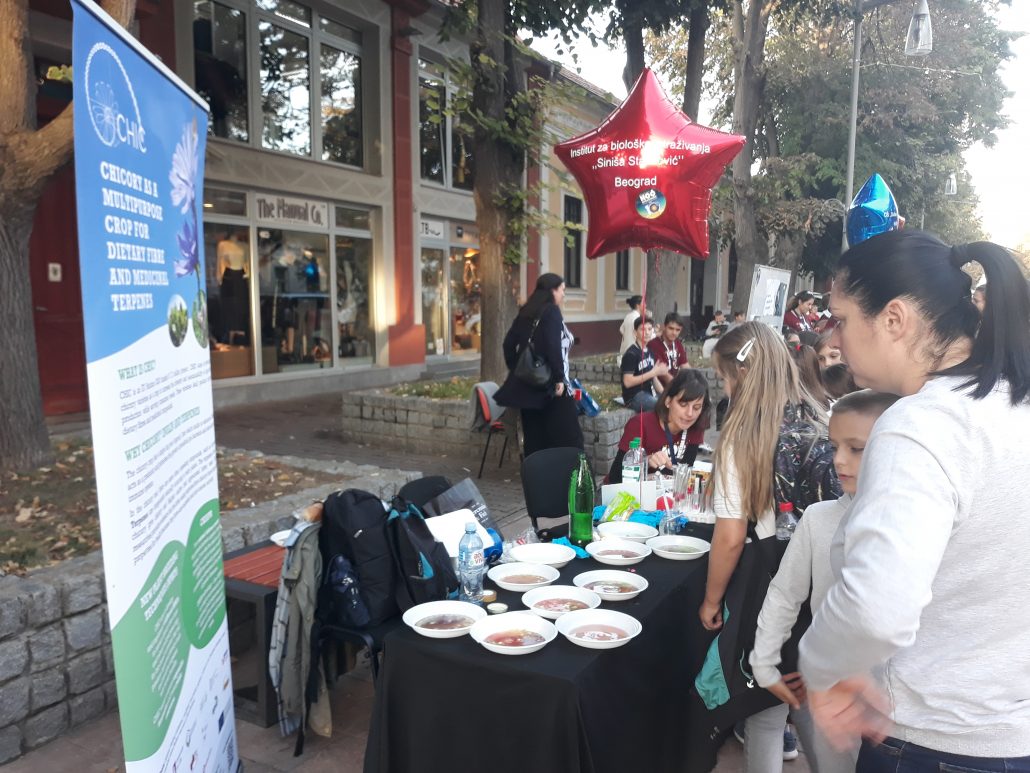
The objective of CHIC’s in this area is to develop four different methods for genome editing of chicory. These methods differ in their degree of ‘DNA invasiveness’: the extent to which CRISPR genes are introduced into the plant’s DNA. In the end all four methods lead to identical genetic outcomes.
CHIC methods related to the presence of CRISPR DNA in the chicory plant’s DNA
These two methods are based on stable integration of CRISPR genes in the chicory genome, leading to so called transgenic chicory plants. After the CRISPR genes have done their work, the genes are removed from the genome. In the 1st method the crossing and selection will be used to select offspring plants without the CRISPR genes and with the desired mutation. In method 2, specialized enzymes will be used to remove the CRISPR genes from the plant’s DNA, so making crosses is not needed.
During the 1st two years of the project, thanks to applying the 1st method we have obtained transgenic chicory plants. These plants are now being analyzed for functional edits in the chosen target genes: genes involved in the production of the enzyme germacrene A synthase. This enzyme is essential for the production of terpenes.
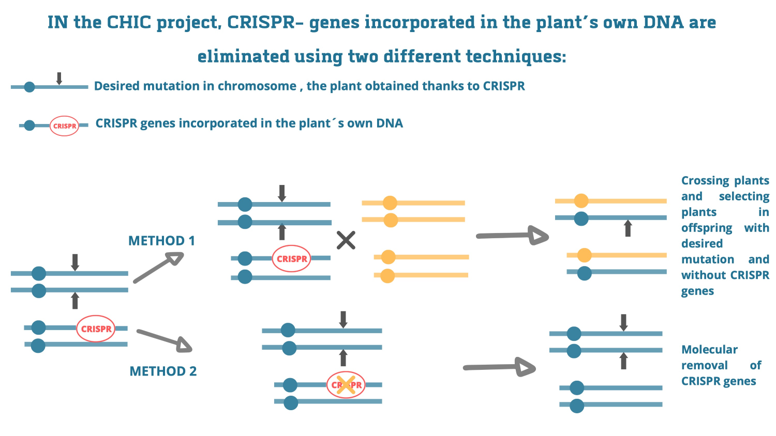
Methods related to the non-presence of CRISPR genes in the plant’s DNA
These two methods are based on administering CRISPR tools to chicory cells without incorporating CRISPR genes in the plant’s DNA.
In method 3 plasmid-DNA that harbours CRISPR genes, is introduced into individual chicory cells. Plasmid DNA is best known from bacteria: circular DNA molecules that encode important traits. After introduction into a chicory cell, the CRISPR DNA is expressed and the CRISPR tools are being assembled in the cell. The plasmid DNA is eventually degraded.
In method 4 the CRISPR tools, protein and guiding RNA, are assembled outside the plant cell and then introduced into plant cells. This way there is no CRISPR DNA entering the plant cells.
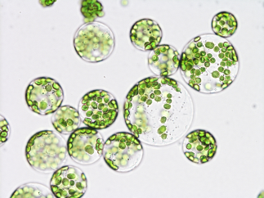
For all methods we need to treat individual chicory cells (protoplast). The challenge then is to grow complete plants from these single cells. We have shown that this is indeed possible. We have also optimized techniques to introduce plasmid DNA and the CRISPR tools into chicory cells.
This has already resulted in plant cells in which the genes involved in the production of the enzyme germacrene A synthase are permanently disabled, thanks to the small alteration the CRISPR tools made in the plant DNA.
Optimizing the CRISPR tools
One of the CRISPR tools is a guide RNA (gRNA) molecule. The other is an enzyme called Cas9. The gRNA guides the Cas9 enzyme to the place in the plants’ DNA where a mutation is desired. We have designed gRNAs and have shown that they indeed guide the enzyme, enabling it to temporarily break the DNA at the correct place.
We have obtained plants with desired mutations in both chromosome sets (chicory is diploid) and in many or even all the gene copies chicory possesses. We are now testing the plants for the terpene content that may have some type of bioactivity.
Genome insight
The existing DNA screening techniques are not effective to screen plant material for small changes in the DNA in a high throughput manner. Therefore we are developing a new technique, based on techniques one of the partners developed for kiwi.
During 2019, the partners decided to jointly invest into a better assembled genome sequence of chicory, as the available genomic databases were of insufficient quality for our research.
On Friday 27th of September, 2019 Fondazione Edmund Mach (partner in H2020 CHIC project) made an exhibition of CHIC project.
University and school students, retired people and families could see in vitro cultures and protoplasts through the microscope and do some tasting of our nice CHIC products.
On 11 September 2019 Michiel de Both (KeyGene) visited the Vikki Plant Science Centre of the University of Helsinki (Finland), to give a seminar as an invited speaker in their seminar series in plant science. The seminar covered genome editing technology in crop plant breeding, as well as the CHIC program, and was attended by ~80 people.
Because of the strong concerns in the Finnish plant science community about the 2018 Court of Justice ruling, the institute organized a panel discussion to debate issues of regulation, IP and science policy related to genome editing.
The panel consisted of a representative of the Finnish seed company Boreal Plant Breeding Ltd., of the Finnish Food Safety Authority Evira, of Kirsi-Marja Oksman-Caldentey of CHIC partner institute VTT, of Michiel de Both on behalf of KeyGene and of Alan Schulman, the current president of the European Plant Science Organization EPSO.
Journalists and politicians present in the audience took part in the discussions, which concluded with the realization that any change in the European regulation must be instigated by the EU member states, supported by informing stakeholders and the general public of the importance of plant breeding and innovation for the European economy.
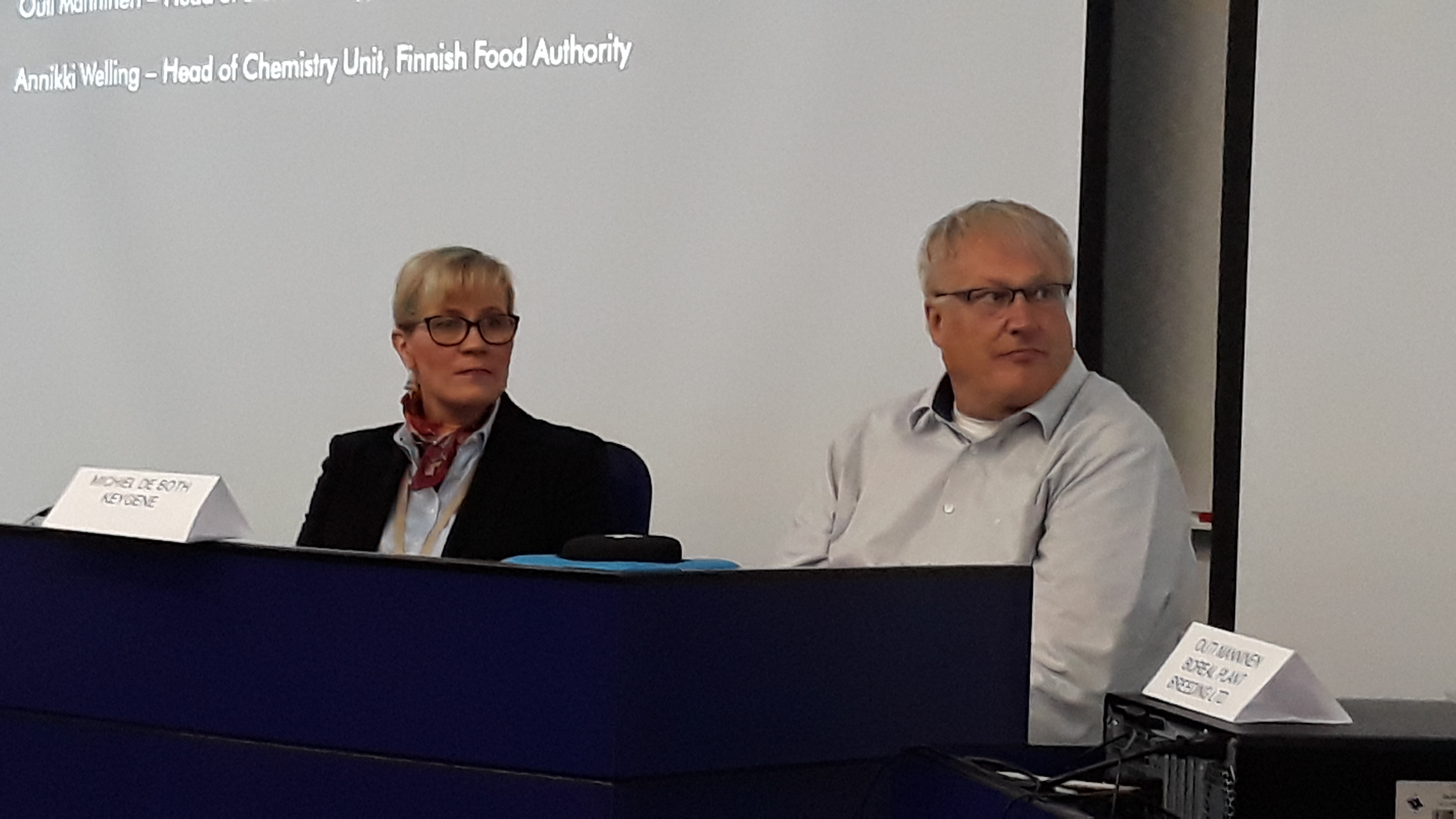
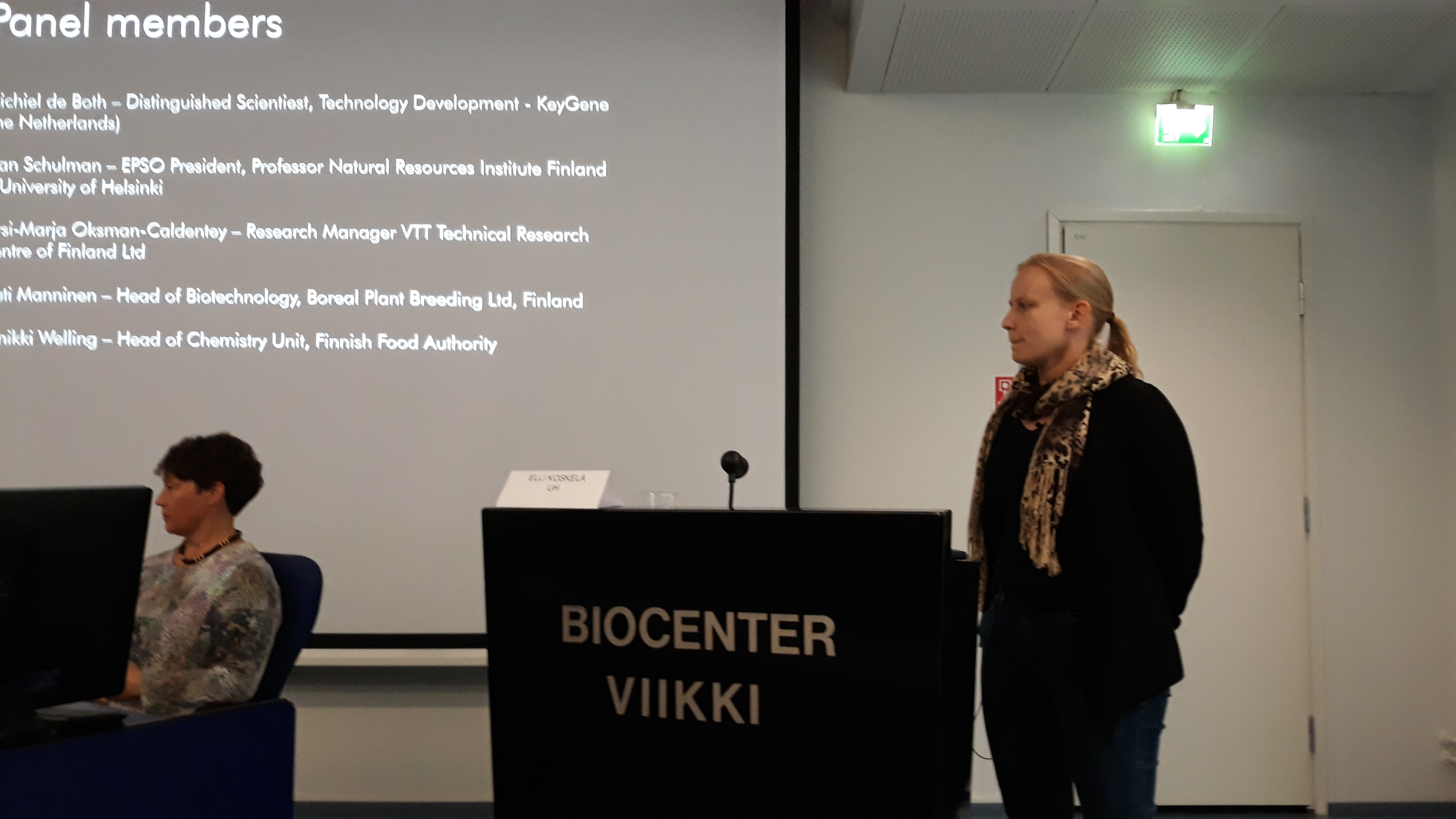
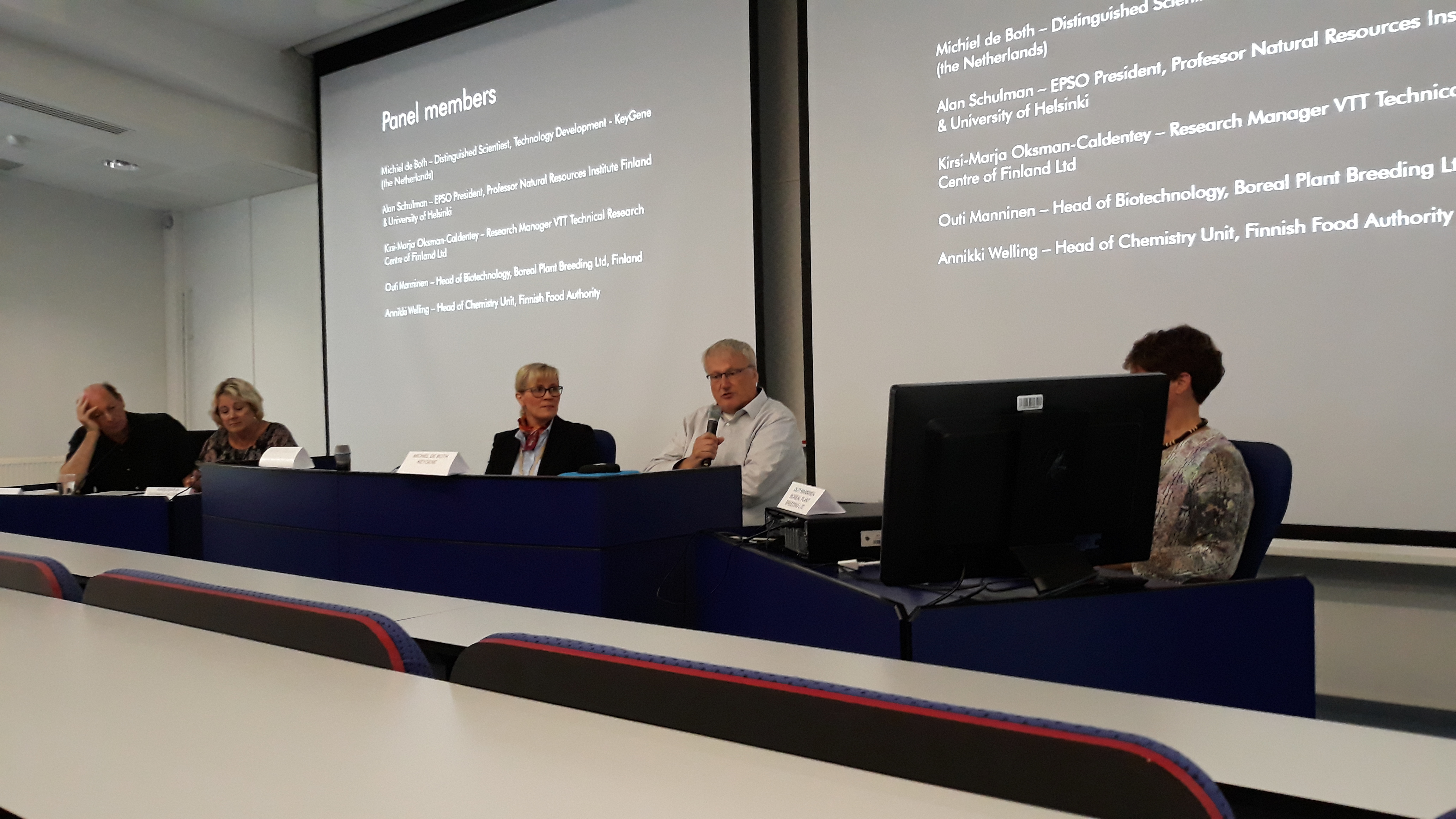
During the night of September 27th the Museum of Science in Trento (MuSe) will be part of the European Researchers’ Night 2019, and it will host the staff from Fondazione Edmund Mach (FEM) to talk about their research topics.
The event is free and open to all the people, from kids to elderlies, starting from 6PM and lasting until midnight. It will consist both of short talks and demo/hands-on sessions, where the public will be involved with different science topics and invited to ask any question related to the research activity.
For CHIC project, scientists will talk about New Plant Breeding Technologies and Cas9 delivery inside plant cells, showing in vitro material (plants, protoplasts at the microscope) and explaining the challenges faced while doing Genome Editing in industrial crops.

The biennial international Fascination of Plants Day (FoPD) is an event encouraging people from around the world become fascinated and enthusiastic about plants. Coordinated by the European Plant Science Organization (EPSO), it takes place globally on May 18, every uneven year since 2012.

In 2019, for it’s fifth edition, FoPD was a huge success gathering 862 events across 52 countries! Thanks to our 56 national coordinators, thousands of enthusiastic event organisers, partners, 5 national patronages and sponsors we have created real success stories. To know more about them, check our Fascination of Plants Day Success Stories 2019 publication.
In 2021, Fascination of Plants Day will be back for a new adventure. While waiting for its launch you can follow us on Twitter (@PlantDay18May), Instagram (@fascinationofplantsday), Facebook, Youtube and on our website: http://www.plantday18may.org
We welcome you to join us in preparing for Fascination of Plants Day 2021! Get organizing events in your country and keep tweeting about plants (#PlantsDay, #FoPD). We look forward to seeing you all in 2021!
Contact: Global Coordinators: Alexandra Barnoux, EPSO, BE; Trine Hvoslef-Eide, Norwegian University of Life Sciences, NO, Przemysław Wojtaszek, Adam Mickiewicz University, PL; Karin Metzlaff, EPSO, BE
We already have our 1st CHIC piece of art. The CHIC – animation created by artist Jakub Kaczmarek with ASSF/Art & Science Node.
During the 20th and 21st of June, the CRISPRcon conference was organised by Wageningen University and Research and the Keystone Policy Centre in Wageningen, The Netherlands.
The objective of the conference was to foster discussions about the future of CRISPR and related gene editing technologies across a variety of applications in agriculture, health, conservation and more. Researchers, industrial representatives, consumer organizations, organic farmers, traditional farmers, patients’ organizations, policy makers, EC representatives, environmental associations and students, took part in the conference.
The conference consisted of a mix of panel discussions, round tables (more than 30) on topics brought in by the audience and short lightning presentations on CRISPR applications. Students and farmers organised side-events to discuss about their perspectives. Commissioner for Health and Food Safety Vytenis Andriukaitis, gave his view about the new gene editing techniques emphasizing the importance of the dialogue on this matter in Europe. An inspiring talk was given by geneticists, writer and BBC broadcaster Dr. Adam Rutherford who made a comparison about the genetic evolution and the evolution of hip-hop music.
It was interesting to see that many of the topics that were discussed at CRISPRcon are addressed by CHIC such as the importance of hearing diverse voices, regulation of process or product, traits that are beneficial for consumers, large scale (staple crop farming) versus small scale local farming, access to CRISPR technology (IP and patents), safety assessment, regulation and who decides.
Several CHIC partners contributed to the meeting. Katarina Cankar presented the CHIC project in her lightning presentation on “Breeding Healthier Crops: Dietary fibers and medicinal terpenes from chicory roots”. Other CHIC partners paticipated in round table discussions on “CRISPR Education and Outreach”, “Indigenous Perspectives on CRISPR technology”, “If we edit it, will you eat it?”, “Transparency approaches”and “Lets’s avoid a trench war on CRISPR food”.
Through this discussions we gained new insights and established many contacts with divers stakeholders and new link to research projects around the world that align well with CHIC.